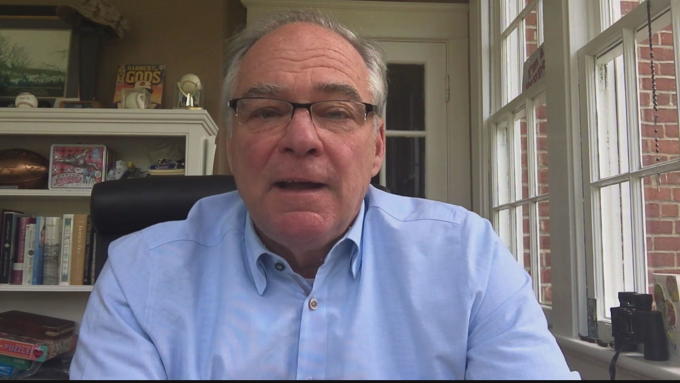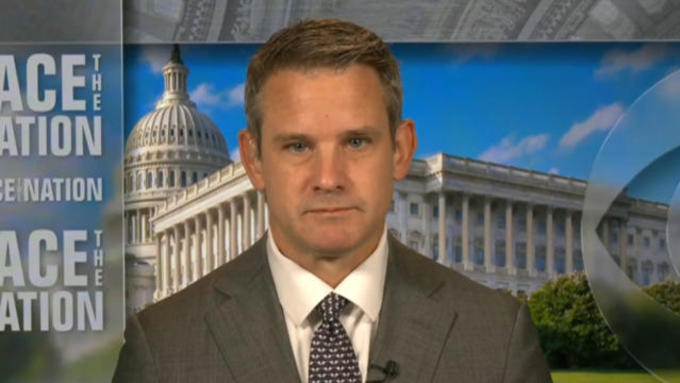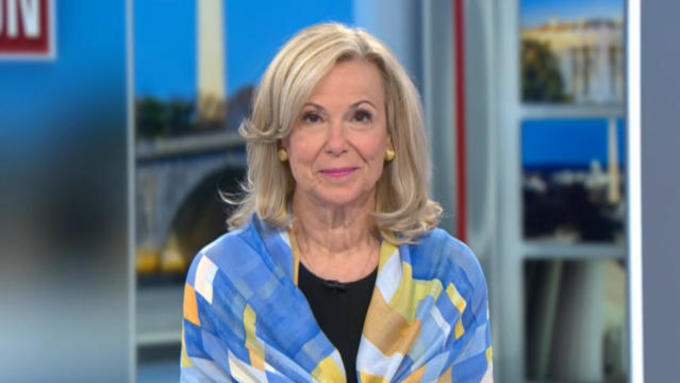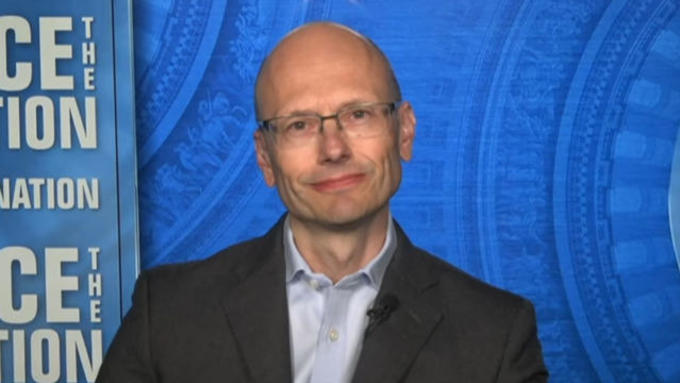| "If there were to be an invasion of a NATO country, a kinetic or even a cyber-attack, or if there were to be use of chemical or nuclear weapons in Ukraine, that would change the equation. But for now, I think the right strategy is to flood the zone with military and humanitarian aid." - Sen. Tim Kaine, Democrat of Virginia, says it would be "premature" for Congress to authorize use of force in Ukraine. Welcome to the "Face the Nation" Five at Five newsletter. Scroll down for your five takeaways from today's broadcast of "Face the Nation with Margaret Brennan" on CBS. Did someone forward you this? Sign-up at cbsnews.com/email. 1. Kaine: Congress needs to push Ukraine aid package "very, very quickly" 
Sen. Tim Kaine, Democrat of Virginia, said there is a "bipartisan resolve" in Congress to approve funding to send more military and humanitarian assistance to Ukraine. He said this aid is "necessary to help Ukraine win and beat Russia's illegal invasion of their country."
What we asked: "We woke up to those images of Speaker Pelosi and top congressional Democrats walking around downtown Kyiv. It's a statement of support. I know President Biden has asked for that statement to be backed up with $33 billion of funding from Congress. How quickly do you think this will get done?" What Kaine said: "We'll turn to it as soon as we get back to the Senate tomorrow. And I think we need to push it very, very quickly. Obviously, we just did an aid package for Ukraine about a month ago that was about $13 billion. And that is a dramatic escalation over what we did in 2021 and even before that. But this additional aid is necessary to help Ukraine win and beat Russia's illegal invasion of their country." Why it matters: Senate Majority Leader Chuck Schumer said Wednesday that both passing Ukraine funding and approving another round of COVID-19 pandemic relief demand "swift and bipartisan action." But it's unclear how quickly the request will move through the Senate, as a bipartisan $10 billion deal on COVID support has become ensnared in a debate over immigration and border policy. Senate Minority Leader Mitch McConnell, however, said he is supportive of the $33 billion Ukraine proposal. 2. USAID Administrator: There is a "desperate need" for additional aid in Ukraine  Samantha Power, administrator for the U.S. Agency for International Development (USAID), is calling on Congress to approve the $33 billion aid package for Ukraine that President Biden proposed last week, saying previous funding approved by Congress for humanitarian assistance had a "very, very high" burn rate. She said the United States' aid to Ukraine has been the "the means by which the Ukrainians have been able to fight back and hang on as long as they have." What we asked: "That funding the president asked for this week is about $33 billion. Congress holds the purse strings here, and it took them about three weeks to get the aid passed last time around. How long can you wait for the funding that the president has asked for here? And what are you doing in the meantime to prevent things like a global famine?" What Power said: "First, let me express gratitude to the Congress for the prior supplemental package. We are spending that money now in Ukraine in order to meet humanitarian needs. You're right. Not in Mariupol, where the city is besieged, not able to get that food in there. But there are vast swaths of Ukraine that have been newly liberated by Ukrainian forces, where there is desperate need, everything from demining to trauma kits to food assistance, since markets are not back up and running. And so that assistance is flowing. And it's also flowing to third countries that are feeling these huge cascading effects of Putin's war, like the spiraling food prices, like the lower supplies of fertilizer, wheat, grain. You know, you have as many as 40 million people that could be pushed into poverty now just because of Russia's war. So we're already spending some of that money, but the burn rate is very, very high, as prices spiral inside Ukraine and outside Ukraine. So that's why this supplemental is so important. It entails both humanitarian assistance, $3 billion of humanitarian assistance to meet those global needs, which are famine-level, acute malnutrition needs. And it includes very significant direct budget support for the government of Ukraine, because what we want to ensure is that that government can continue providing services for its people. Putin would like nothing more than the government of Ukraine to go bankrupt and not be able actually to cater to the needs of the people. That would weaken Ukrainian solidarity, and Putin wants nothing more, of course, than to strengthen his bargaining hand here as he exerts military pressure and financial pressure at once. We can't let that happen." Why it matters: President Biden on Thursday requested an additional $33 billion in aid for Ukraine, most of which will go to additional military and security assistance for the country and Eastern flank allies. The president's request also included $8.5 billion in economic assistance to help Kyiv maintain government functions, and $3 billion in humanitarian assistance to support resources to address worldwide food security needs. The president said the $3.5 billion in drawdown authority that was authorized for Ukraine by Congress in a bipartisan omnibus spending package enacted in March has nearly been exhausted, underscoring the need for lawmakers to swiftly approve more funding. 3. Kinzinger says he would "love" to see former Vice President Mike Pence testify before the House January 6 committee  While investigators have requested some Republicans in Congress appear before the panel voluntarily, committee members have not yet decided whether they will issue subpoenas to compel lawmakers' testimony. Rep. Adam Kinzinger, Republican of Illinois, said he favors subpoenaing Republican members, but noted moving forward with one is "a strategic, tactical decision and a question of whether or not, you know, we can do that and get the information in time." What we asked: "Vice President Mike Pence did the right thing in terms of certifying the election. He is a central player in this story. As a Republican, do you want to see him come forward and actually speak to you?" What Kinzinger said: "Yes. I would love to see that. I hope he would do so voluntarily. These are decisions I think that we're going to end up making from a tactical perspective in the next week or two as we basically pin down what this hearing schedule is going to look like, the content and as we go into the full narrative of this thing. I would hope and think that the vice president would want to come in and tell his story because he did do the right thing on that day. If he doesn't, then we'll look at the options we have available to us if there's information we don't already have." Why it matters: Pence played a crucial role in the congressional proceedings on January 6, rebuffing pressure by then-President Donald Trump to reject electoral votes from key battleground states he lost, and ultimately certifying President Biden's win. While some of his aides have answered questions from House investigators, Pence has not done so. Kinzinger also said Sunday that the committee will make decisions about who it wants to hear from in the next two weeks as it works on its hearing schedule and the content of upcoming proceedings.
4. Birx warns the U.S. should expect a summer COVID-19 surge  Former Trump administration COVID-19 response coordinator Dr. Deborah Birx said immunity against the virus "wanes," which is one reason she expects the U.S. to see another surge of COVID-19. She said both vaccinated and unvaccinated individuals are carrying it. What we asked: "We're now at close to 1 million deaths. Infection rates are going up. Hospitalizations are going up. I think it was just about 18% on the week. Do you think we are done with these massive waves of infection?" What Birx said: "I like to look at the whole spectrum of the last two years. And so, if you look at what we've been through, we went through a mini Alpha variant surge in the same locations last year at this time. Then we went into that lull of May, where everybody thought it was over, and in middle of June, and then we had the predictable surge across the South. And what you need to be looking at is global data. So I follow South Africa very closely. They're good about testing. They're good about sequencing and finding their variants. They're on an up slope again. Each of these surges are about four to six months apart. That tells me that natural immunity wanes enough in the general population after four to six months that a significant surge is going to occur again. And this is what we have to be prepared for in this country. We should be preparing right now for a potential surge in the summer across the southern United States because we saw it in 2020 and we saw it in 2021." Why it matters: Following the record surge in cases driven by the Omicron variant over the winter, more than half of all Americans and around three in four children have now survived a case of COVID-19, new data from the Centers for Disease Control and Prevention suggest. The new findings were published Tuesday in the CDC's Morbidity and Mortality Weekly Report. 5. Moderna chief medical officer: Safety profile of kids vaccine is "very reassuring"  Dr. Paul Burton, Moderna's chief medical officer, said the company has begun submitting data on its vaccine for kids to the FDA and adds that the company is committed to having all necessary information fully submitted by May 9. What we asked: "Are you confident that Moderna will be ready for the FDA to review your vaccine at their June meeting?" What Burton said: "Yes, absolutely. So we submitted our data last week. I think the FDA now have, you know, all of the core fundamental data they need to be able to begin that application review. So, yes, we're very confident." Why it matters: Moderna said it has formally submitted a request to the Food and Drug Administration for authorization of two doses of its COVID-19 vaccine in children younger than 6 years old, kicking off a long-awaited federal review process that could soon greenlight the first immunizations for these youngest Americans. Burton said their research has found the vaccine to be safe for kids. "When we look at the rates of very high fevers, a fever over 104 degrees Fahrenheit, only 0.2% of these little kids experience that. And typically in this age range, for other approved vaccines, we would see rates of maybe 1%," Burton said. |
Post a Comment
0Comments